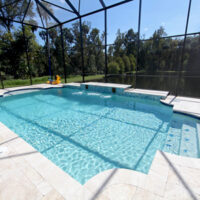Prepare Your Pool For Florida Winters

Florida winters are notoriously mild, with an average temperature of 72 degrees F (22 C) during the winter months. This means that many Floridians and tourists are able to enjoy stereotypically summery activities even while the rest of the country freezes, and no activity is more popular than swimming, even out of season. Many Floridians do close their pools completely in the winter, but for those who do not, it is crucial to not only ensure the pool is well kept, but to make certain that the safeguards protecting vulnerable people from accidents are still in working order.
Pool Hygiene & Premises Liability
It can be easy to assume that since your pool is on private property, you have no duty to maintain it or exercise reasonable care toward the people you permit to swim in it. This is simply not accurate, and a failure to understand your potential risk can wind up being very costly. Florida’s law of premises liability means that a landowner must take certain steps to make your land (and thus, your pool) safe for people who use it. Different visitors may be owed different levels of care – for example, an invitee is owed more care than a trespasser – but care is still owed.
One common example of required care is pool cleanliness. While some Floridians close their pool during the winter months to conduct maintenance on it, even those who leave it open must do the same cleaning and filtering chores. Maintenance companies suggest several tips and tricks to properly ‘winterize’ your pool, such as balancing the chemicals properly or using a pool cover at night even if you plan to keep yours open, so as to cut down on your tasks while still being able to ensure your pool is as safe as possible. A failure to keep your pool clean may lead to liability if anyone who swims in it gets sick.
The RSPSA
Florida has a specific pool safety act aimed at private swimming pools, referred to as the Residential Swimming Pool Safety Act (RSPSA). The law correctly recognizes that while pools are a wonderful amenity for families and friends, they do require significant upkeep and safety protocols, and anyone who fails to maintain their pool in a safe condition might possibly face liability if any accidents occur. It is considered a matter of public policy that pools be maintained strictly – in other words, a poorly-maintained pool has the potential to be a major danger to the public at large, so the law is strict about avoiding that outcome.
The RSPSA requires that every private pool have at least one of four major safety instruments installed, so as to help eliminate the risk of accidents, especially for children and the elderly – Florida leads the nation in drowning deaths for children aged 1-4. Those safeguards are (1) a locking pool cover; (2) a barrier or fence, at least 4 feet tall, surrounding the entire pool; (3) having one pool entrance that has a self-closing or self-locking mechanism; and (4) an audible alarm for all the doors and windows that provide direct access to the pool. If your pool does not have at least one of these, anyone injured will be able to file suit against you for liability.
Call A Tampa Pool Safety Attorney
Even in winter, a pool can be a place for accidents, and if you are injured because someone did not prepare, you may be able to seek compensation for your injuries. The Tampa premises liability lawyers at the Rinaldo Law Group can try to help answer any questions you may have. Do not hesitate to call us today for a free consultation.
Resource:
leg.state.fl.us/statutes/index.cfm?App_mode=Display_Statute&URL=0500-0599/0515/0515.html
https://www.tampainjuryaccidentlaw.com/florida-slip-falls-2/












